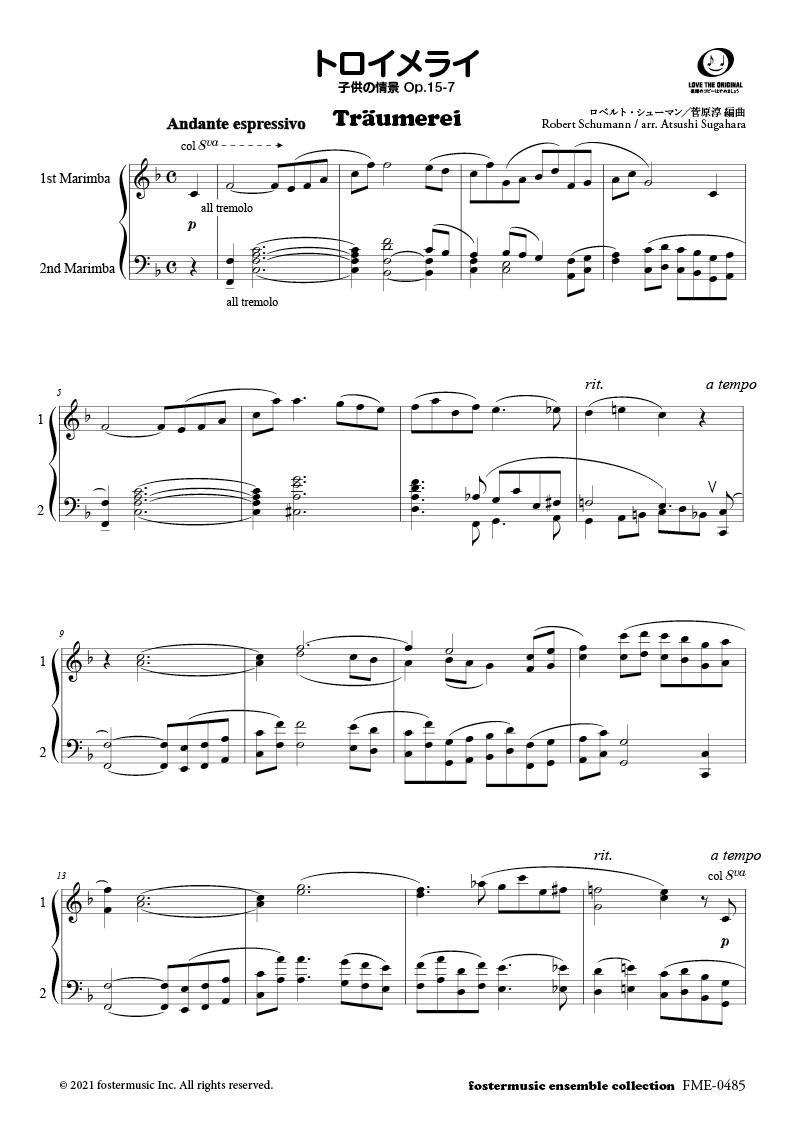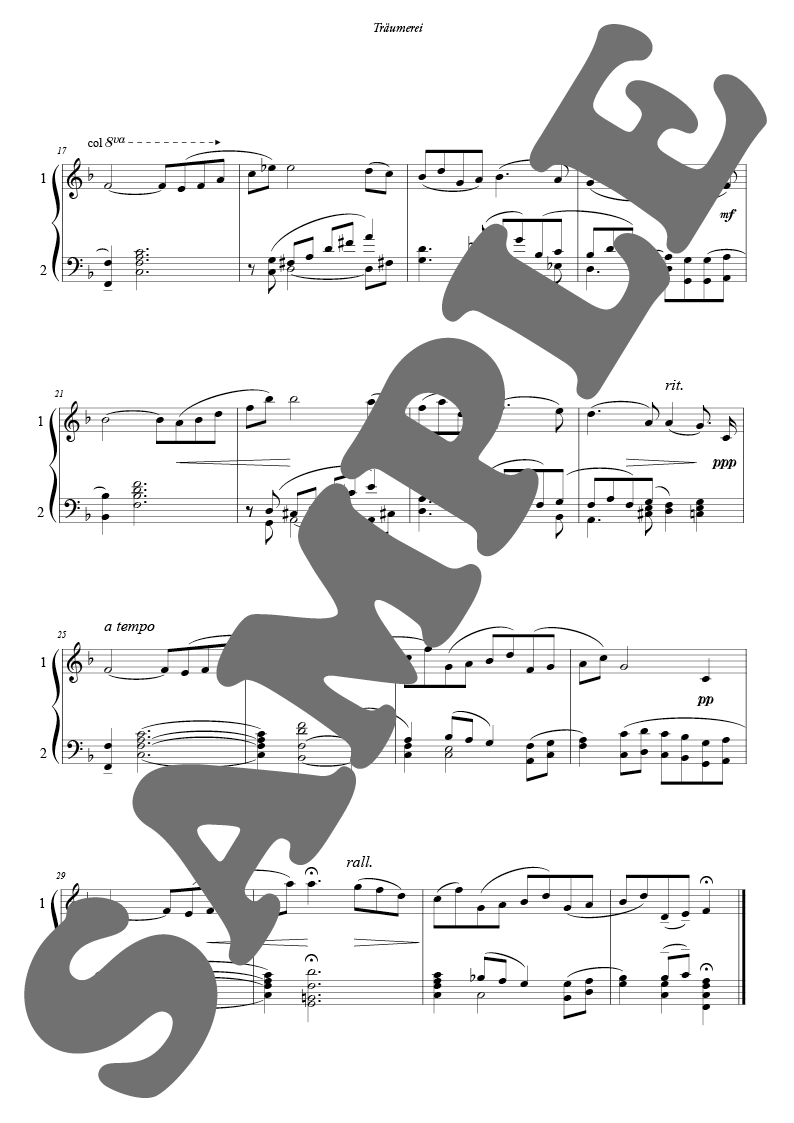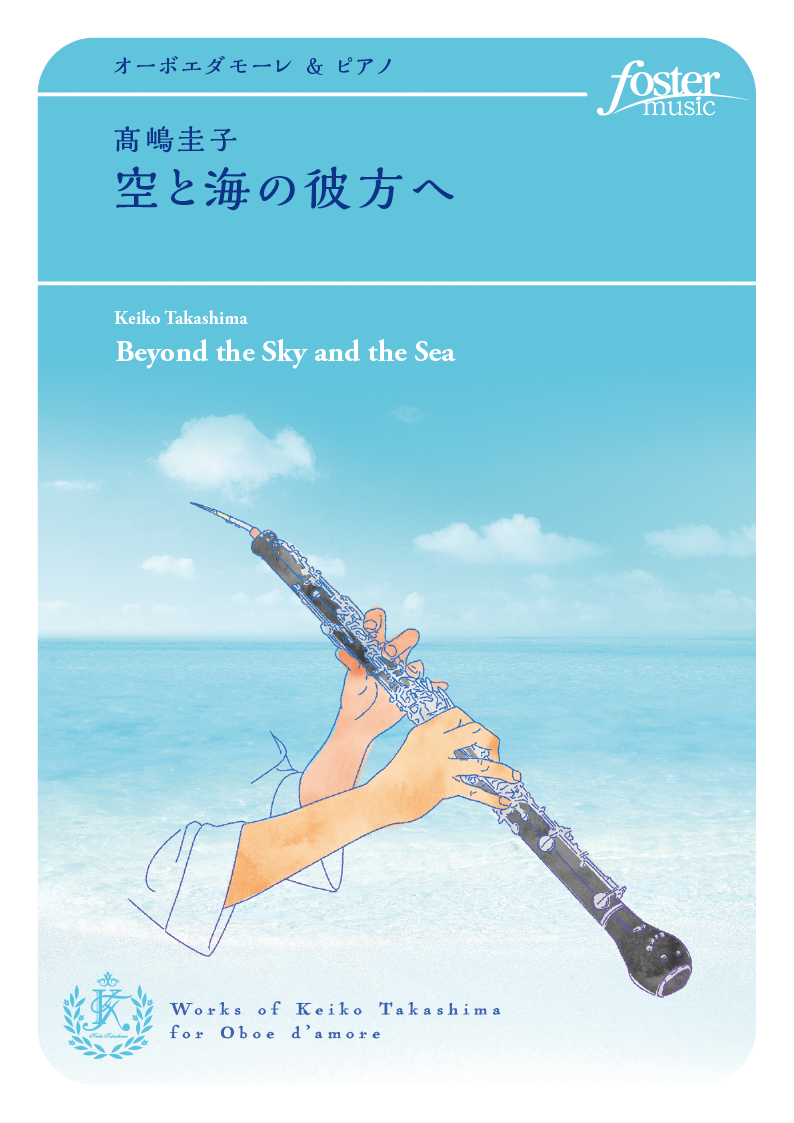トロイメライ - 子供の情景 Op.15-7(マリンバ連弾):ロベルト・シューマン arr. 菅原淳 [打楽器2重奏]
・1配送につき税込11,000円以上のご注文で国内送料無料
・コンビニ後払い、クレジットカード、銀行振込利用可
・[在庫あり]は営業日正午までのご注文で即日出荷
・International Shipping
- 作曲: ロベルト・シューマン
編曲: 菅原淳 - 演奏時間:0:03:20
フォスターミュージック/FME-0485
- 概要
- 編成/曲目
- 補足
- ENGLISH
トロイメライ - 子供の情景 Op.15-7(マリンバ連弾)
シューマンのピアノ曲「子供の情景」よりの7曲目で、「トロイメライ」は日本語に訳すると「夢想」。
マリンバ1台での2重奏で、マリンバの特徴である「トレモロ」を生かし、表情豊かな響きとハーモニーで、夢の世界を演出しましょう。(菅原淳)
●演奏上のアドバイス
トレモロが早くなり過ぎず、時にビブラートのように意識して演奏すると様々な表情が出ると思います。マリンバの響きを活かしながら場面ごとにさまざまなトレモロが表現できるといいですね!2パートがあたかも「会話」しているように演奏しましょう。
各フレーズはそのダイナミクスの範囲中(多少ははみ出てしまっても良いと思います)で抑揚をつけて演奏しましょう。例えば1小節目の2拍目の和音よりも2小節目の2拍目の和音の方が広がりが出るので豊かに演奏するとフレーズの方向性が見えると思います。実際に声に出して歌ってみると良いアイディアのヒントになるのでは。3小節目アウフタクトからは上パートがメロディですが、2ndパートの上声部が単に「伴奏」に回ることなく、デュエットしているように絡むようにしましょう。9小節目アウフタクトから2ndパートにメロディが移ります。豊かな響きが出る様にオクターブ下の音が支えになるようたっぷり演奏するようにしましょう。
25小節目からのpppは聴かせどころです。ささやくように演奏し、a tempoとありますが一音一音丁寧に繊細な表現ができるように工夫してみましょう。
みなさんご存知のように原曲はピアノのための作品です。アゴーギグやフレーズの持っていきかたなど参考になると思うのでピアノでの演奏をたくさん聴いて、決してテンポ通りになり過ぎず表情豊かな演奏になるよう心がけてみてください。(西久保友広)
仕様
- アーティスト
- 作曲: ロベルト・シューマン
編曲: 菅原淳
- 演奏形態
- 打楽器
- 編成
- 2重奏
- 演奏時間
- 0:03:20
- 商品カテゴリ
- アンサンブル楽譜
- 出版社 / 品番
- フォスターミュージック / FME-0485
- JANコード
- 4560318476615
- 発売日(年)
- 2021/06/30
- キーワード
- ,クラシックアレンジ
楽器編成
- Marimba (2Player)
菅原淳(Atsushi Sugahara)
大阪生まれ。東京藝術大学卒業。フランス政府給費留学生として、パリ・コンセルバトワールに留学。
74年、ラ・ロッシェル国際打楽器コンクール第1位。グループ「3マリンバ」、アンサンブル「ヴァン・ドリアン」を結成、作曲家に曲を委嘱し、数多くの日本初演をする。
80年、パリで行われた国際打楽器コンクールの審査員を務める。
83年、中島健蔵音楽賞を受賞。平成7年度文化庁芸術祭優秀賞を受賞。
99年、朝日現代音楽賞を受賞。CD「菅原淳/木と皮の鼓動」「花と星」をリリース。
打楽器アンサンブル「パーカッション・ミュージアム」と「パーカッション・ギャラリー」の主宰。
38年間、読売日本交響楽団で主に首席ティンパニ奏者を務めた。
現在、東京音楽大学客員教授、昭和音楽大学客員教授。
- サイズ
- A4/1cm未満
TRAUMEREI:Composer: Robert SCHUMANNArranger: Atsushi SUGAHARA
"Traumerei" is the seventh piece from Schumann's "Scenes from Childhood" written for the piano, and it can be translated as "Dreaming."
This duet for a single marimba allows you to make the most of the instrument's characteristic tremolo to create a magical world with expressive sounds and harmonies. / Atsushi Sugahara
PERFORMANCE ADVICE
The tremolos should not be played too fast, and be aware of where you can play them like vibratos to create a variety of different expressions. Try your best to make use of different kinds of tremolos for different scenes while drawing on the marimba's sound! The piece should be performed as if the two parts are engaged in a dialogue.
Every phrase should be performed with the appropriate accents within the limits of the stated dynamics (although it is fine to be a little exuberant at times). For instance, the chord on the second beat of bar 2 should be more prominent than the chord on the second beat of bar 1, and playing it in a more lively way can create a sense of direction for the phrase. Sometimes, humming the melody aloud may give you a good idea of how to proceed. The upper voice of bar 3 is the melody, but the upper voice of the second part should not be merely regarded as the accompaniment as it should be engaged in the performance as part of a duet. From bar 9, the melody shifts to the second part. Make sure to play the notes that are an octave lower with a greater weight to enrich the sound of the piece.
The section from bar 25 is the highlight of the piece. Play it as if you were whispering, and make an effort to articulate each note as meticulously and gracefully as possible, even though this section is marked as "a tempo."
As you all know, the original piece was written for the piano. This will be a good piece for you to learn more about speed variations and musical phrases. Try to listen to more piano performances and try your best to perform this piece with a rich expression without adhering too strictly to the tempo markings. / Tomohiro Nishikubo
Specifications
- ARTIST
- Composer: Robert SCHUMANNArranger: Atsushi SUGAHARA
- INSTRUMENTATION
- Percussion / Duet (2parts)
- DURATION
- 0:03:20
- PRODUCT TYPE
- Set / ENSEMBLE
- PUBLISHER / Code
- fostermusic Inc. / FME-0485
- JAN
- 4560318476615
- RELEASE
- 2021/06/30
- OVERSEAS SHIPMENT
- Ask
- EUROPEAN PARTS
- Not Included
For foreign customers,
You can now purchase from overseas via WorldShopping BIZ.
Study scores, ensembles, and CDs can be ordered directly from our website.
Rental sheet music and some other items are not covered by this cart system, so please contact us by email.

![トロイメライ - 子供の情景 Op.15-7(マリンバ連弾):ロベルト・シューマン arr. 菅原淳 [打楽器2重奏]](/html/upload/save_image/FME0485_1.png)












